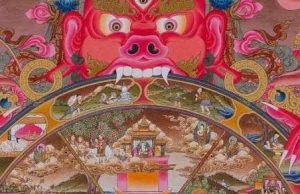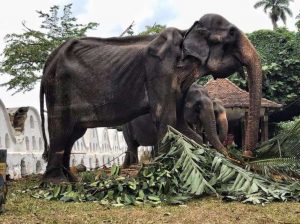Beginner’s Mind is a special project from Buddhistdoor Global collecting insightful essays written by US college students who have attended experiential-learning-based courses related to Buddhism. Some of the authors identify as Buddhists, for others it is their first encounter with the Buddhadharma. All are sharing reflections and impressions on what they’ve learned, how it has impacted their lives, and how they might continue to engage with the teaching.

When the mind was thus concentrated, purified, bright, unblemished, rid of defilement, pliant, malleable, steady, & attained to imperturbability, I directed it to the knowledge of recollecting my past lives. (Gotama Buddha, Maha-Saccaka Sutta)
“Covent Plaza—”
As the bus pulls back into the road and picks up speed, the city becomes a blur of gray and green. Harriet watches it all whiz by her window: storefronts, trees, sometimes a lonely face.
She’s been reading a book on the life of the Buddha. It’s a fat book on cheap paper, filled with black-and-white illustrations. It was part of a series on world religion, an accidental survivor of the garage sale where she boxed up all her unwanted books and high school things and sold them away. The author, an Oxford don, long dead, has a habit of dropping Pali words untranslated into his sentences, and at just this point in her bus ride yesterday she had set the book down in frustration, unable to understand the difference between samatha and vipassanā meditation. Now it is in her bag. She is watching the city go by.
Outside the clouds are low and heavy. Maybe rain. In this part of the city the buildings are tall and uniform, with glass plate windows on the upper levels that shine on sunnier days. Normally the streets are a welter of coders, scammers, tourists, cops, jaywalkers, dog-walkers, and babysitters, all churning like leaves in a windstorm. Today, in the dead calm, the only faces are delivery workers and canvassers, moving quickly from one impassive building to the next. Harriet lets it all slide past her.
Many and many years ago, during one of those high-school summers that stressed and exhausted Harriet even more than classes did, she had taken this bus through this part of the city every day, on her way to Young Business Leaders. It was a sham summer camp run out of an office suite in the Valenciaga Center, shabbily run but impeccably advertised, with a website featuring the testimonials of parents from all the area private schools. Harriet, rooting through Google in search of an impressive internship to match her friends’, had hastily filled out the application form as soon as she came across it. Within 24 hours there was a congratulatory acceptance email in her inbox, with a fancy header sporting the camp’s logo: a big-bellied Buddha in round glasses, stroking his chin in rumination like a dharmic Steve Jobs.
All her classmates came to camp in their parents’ cars. Only two took the city bus the first day: Harriet, slumped in the furthest-back row of blue plastic seats, earbuds jammed up right next to her eardrums; and a scrawny-looking boy with stringy hair, who caught her attention by squirming and muttering to himself the whole way through the business district. By the time they’d made their way from the bus stop to the Valenciaga Center and straggled together into the club office on the 19th floor, name games were already over and entrepreneurship groups had already been formed. So Rick, the camp’s head counselor and CEO, had paired Harriet and the stringy-haired boy off into a corner to brainstorm ideas for a startup.
“You think he expects any of us to come up with an idea that’ll make him rich?” Harriet said to the boy.
“How about a company that packages Buddhism in syrup and tells Silicon Valley kids and their parents that it’s business advice?” he suggested.
They did every project together. When Rick led a workshop on meditation as a productivity- boosting tool, the stringy-haired boy managed to fall asleep and snore so loud that everyone jumped. When one of the groups pitched an app called Sangha that rewarded users who added friends to the network with “karma points,” exchangeable for bitcoin, Harriet and the boy crashed the prototype with dozens of fake accounts under names like DrDukkha and SonOfMara. Every day on the bus they plotted how to torment the Young Business Leaders. On their rides home, the boy would often tire himself out and fall asleep, and Harriet would look out the window smiling, watching the gray world stream by.
Now, as the bus passes a group of volunteers setting up a donation tent outside Children’s Hospital, Harriet gives herself over to the sensation of movement—the sea of car hoods whipping by, the dull hum of a tire in the wheel well underfoot. She’s looking not at the glass or the outside but at something in between them. She feels near sleep.
And something in her unlocks: a parade of feelings, unleashed by her memory of the boy, for years unthought-of, forcibly forgotten. They arise in her as powerfully as she first felt them, in another life—
the leap of joy when he’d tracked down her email address after they’d parted without exchanging contact information, telling her he’d found it in her byline on the school newspaper and asking if he could have her phone number;
her pride, mixed with a little fear, when after another school night spent talking till 3 he told her that she was the only thing in the world that kept him going;
her panic when he suddenly blew up at her on the phone, in an incoherent maelstrom of curse words and sobs, and later her fury as she lay in bed nursing her wounds last night;
her regret when, again and then again, he texted her apologies and she left them unread, pretending to herself that she’d return to them when she was ready to face him again;
one by one these flared inside her, like flames dancing on a lighter, and one by one they disappeared, sliding with the scenery out of her frame of vision.
Last to go was her love for him, lifting up out of some hiding place inside her she’d forgotten was even there.
When the mind was thus concentrated, purified, bright, unblemished, rid of defilement, pliant, malleable, steady, & attained to imperturbability, I directed it to the knowledge of the passing away & reappearance of beings. (Gotama Buddha, Maha-Saccaka Sutta)
“Heron Street,” the bus says, kneeling. People get off and on.
Harriet turns from the window, blinking spots from her eyes. The newcomers file into seats that place them exactly at the greatest distance possible from their fellow passengers. Harriet, safe in her last-row seat, finds this odd: isn’t that a math problem, maximizing the distance from several unevenly spaced points? Where does it come from, this talent of humans to distance themselves from each other?
“Northeast Street—”
Harriet doesn’t always always take the 6 bus: to get to this part of the city she sometimes takes the 8E, and sometimes she bikes. Any of the people around her she could have seen a dozen times before, or never. She watches them board and alight, but no secret contact-tracer within her thrums.
The gray-haired woman with a dog in her purse and a mask on her face, the young woman looking at her phone with highlighted hair in her eyes, the young man in a beanie muttering into the window glass. Up front, the driver in his high chair, which bounces up and down every time the bus goes over a rut. They form a community now, although they’ll almost certainly never assemble on the same bus again, and once they’ve dispersed Harriet will never be able to track them down again even if she tries. This meaningless little community, so fragile it doesn’t even have a name, and yet if the bus broke down they’d instinctively look to each other for comfort, and if one of their number disappeared into thin air the rest of them would feel frightened and bereft, together.
Harriet doesn’t know that the pandemic is about to force her inside for months, or that the 6 line will be shut down as part of the city’s emergency response, and the 8E line too. But she does know, or can sense, that this community extends far into her future, no matter how impermanent it seems; that the path her life takes will change forever from this moment forward if she so chooses, and they so choose. As she turns her eyes again to the emptiness outside the window, she knows on some level that her will alone will set her on a path to love or loneliness, relief or humiliation, answers or questions, something or nothing. The possibilities swirl outside her window. She does not grasp for them; she is content to watch them twist and twine.
When the mind was thus concentrated, purified, bright, unblemished, rid of defilement, pliant, malleable, steady, & attained to imperturbability, I directed it to the knowledge of the ending of the mental fermentations. (Gotama Buddha, Maha-Saccaka Sutta)
“Valenciaga Center—”
Harriet is on her feet even before she sees the young man near the front of the bus pull off his beanie, his stringy hair falling over his face as he moves toward the door. She is on her feet because she doesn’t know what her future holds, but she knows it’s up to her.
Note: Quotes are from the Maha-Saccaka Sutta, translated by Thanissaro Bhikkhu, https://www.accesstoinsight.org/tipitaka/mn/mn.036.than.html
Andrew Rule wrote this story for his course on Buddhist Economics at Williams College, a private liberal arts college in Williamstown, Massachusetts. Andrew is a senior Comparative Literature major and is currently at work on the first translation into English of the novella Gun Grave by the Chinese writer Ban Yu.











